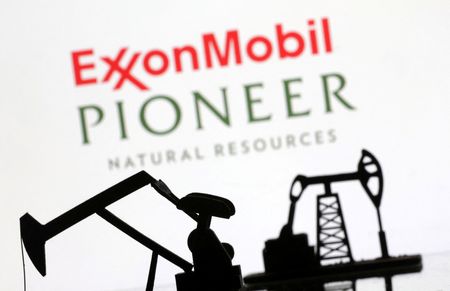 1
1 1
1
(Reuters) – U.S. oil major Exxon Mobil is in advanced talks to buy shale producer Pioneer Natural Resources at about $60 billion, sources familiar with the matter said.
Here is how the deal could impact the energy sector:
WHAT WOULD IT MEAN FOR EXXON AND SHALE?
The deal is for oil- and gas-producing fields that would more than double Exxon’s production of oil and gas from the largest oilfield in the United States, the Permian. The basin is also the most lucrative and prolific shale field at the heart of the U.S. shale industry.
Exxon produced about 620,000 barrels of oil equivalent per day (boepd) in the Permian basin in the second quarter, while Pioneer’s output in the basin averaged 711,000 boepd in the same period.
Exxon would also acquire Pioneer’s leases for land in the Permian that would give it potential to grow production.
WILL IT AFFECT CONSUMERS AND IF SO HOW?
The deal would be for oil and gas fields and the infrastructure to transport production to processing and storage facilities. It is not for oil refineries that supply fuel to gas stations.
That means that while the deal would consolidate more oil production in the hands of Exxon, it would not change control over fuel production at refineries or its distribution to consumers.
It would therefore only have an impact on prices indirectly, if Exxon either raised or cut oil and gas from the fields in a volume high enough to impact global oil and gas prices. The global oil market is over 100 million barrels of oil per day, so the combined Permian output of the two companies would be around 1% of global supply.
Exxon produces much more than that from oil and gas fields elsewhere.
Synergies could reduce the cost of production from the assets, but any savings would benefit Exxon and would unlikely be enough to impact retail global oil and gas prices if they were passed on to wholesale buyers.
CAN WE EXPECT MORE SUCH DEALS?
Wall Street analysts have said Exxon’s potential buyout of Pioneer could be followed by more consolidation in the industry. U.S. oil and gas deals had already jumped in the second quarter to around $24 billion, which was three times the first quarter. The biggest deal was Chevron’s $7.6 billion bid for PDC Energy.
“It could sets off a bit of an arms-race for other big companies that produce in the Permian,” said CFRA Research analyst Stewart Glickman.
“It could create a little bit more urgency … of course, every company’s going to be different, whether they want to do acquisitions or grow organically. But I think it could have that effect.”
(Reporting by Seher Dareen and Tanay Dhumal in Bengaluru; Editing by Maju Samuel)